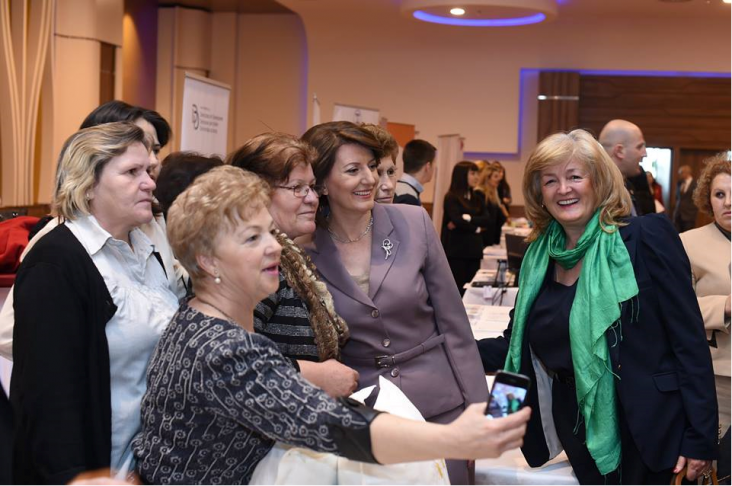
May 2015—When women are elected, they become advocates for issues that affect everyone: better health care, child care and education, among others. In Kosovo, like elsewhere, women often struggle to make their voices heard in predominately male organizations, where their contributions can be dismissed as nothing more than meeting a quota.
Even though Kosovo is led by a woman president, women there continue to face economic, political and social disadvantages. In politics, their representation is seen more as a requirement for political parties than a benefit. This often discourages women from running for office.
In 2015, for the fourth year, USAID partnered with the National Democratic Institute to organize the Week of Women, a week-long gathering of Kosovo’s women thought leaders in politics, business and the media held each year in March.
“When we talk about gender equality in any society, one thing is clear: It cannot be achieved without an active, vocal, organized group of empowered women leaders advocating for their place at the table,” said U.S. Ambassador Tracey Ann Jacobson in her opening remarks for the 2014 conference.
In past years, discussions have centered on women in politics and government, with major local and national elections looming. This year, the conference tackled the impact of and women’s contributions to Kosovo’s rule of law. The conference drew women leaders from all aspects of Kosovo society, with a special focus on the needs of women with disabilities.
“I was happy to see other women with disabilities here as well,” said political activist Xhevrie Peci. “It was so helpful to have an opportunity not only to bring our concerns to the table, but to discuss our shared concerns as women.”
“This week gives women ‘wind on their back’ to push them forward on their chosen field,” added inter-ethnic relations expert Gordana Lazovic.
Following the Week of Women, a select group of 30 women went on for enhanced training in policy development, communications, public speaking, advocacy and new media at the annual Women’s Leadership Academy.
Previous academy graduates have achieved real change. A group from 2012 successfully advocated for the city of Ferizaj/Uroševac to offer free child care for the children of single mothers. The European Union Commission also added rights of single mothers as an objective of its advocacy agenda and, as a result, two Kosovo NGOs received grants to research the issue.
LINKS
Follow @USAIDKosovo, on Facebook, on YouTube
Follow @WeekofWomen, on Facebook







Comment
Make a general inquiry or suggest an improvement.